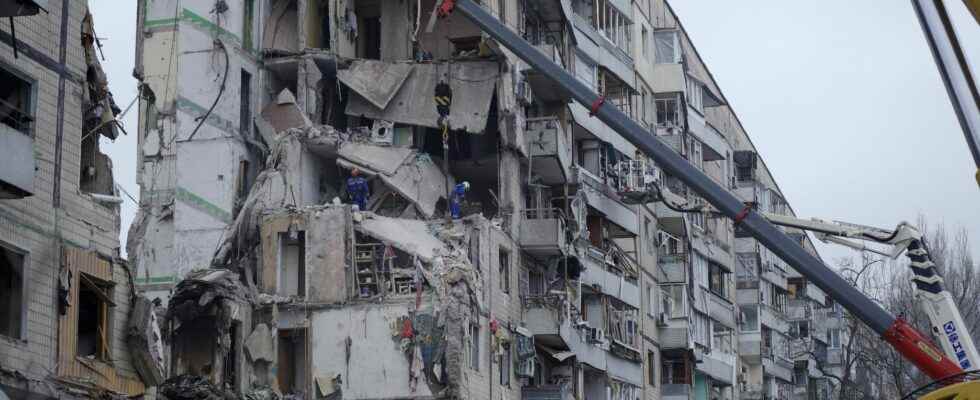The German Foreign Minister launched, Monday, January 16, the idea of creating a “special court” to prosecute the Russian leaders. This position comes after new charges of war crimes against Moscow, for the strike against a residential building in Dnipro which killed at least 40 people this weekend. Annalena Baerbock called during a speech in The Hague to create a “new format” of court to “bring Russian leaders to justice”. This would eventually use Ukrainian law, but would be based abroad with international judges.
The International Criminal Court (ICC) is already investigating alleged war crimes and crimes against humanity in Ukraine. But it is not competent for the “crimes of aggression” of Russia, because Moscow is not a signatory of the Treaty of Rome, founder of the Court. Calls have therefore multiplied since the beginning of the invasion for the creation of a tribunal that can prosecute these crimes of aggression. According to Annalena Baerbock, a discussion is already underway with Ukraine and other allies to create this “new format” of international justice which would serve as a “special solution” to the Russian case.
At the same time, the minister puts on the table the alternative option of modifying the statute of the ICC in The Hague, so that it can try Russian officials for aggression. The only other way at present is through a UN Security Council resolution, but that would be met with a veto from Moscow.
Moscow denies Dnipro ‘war crime’
The day before, European Union officials called the Dnipro civilian massacre a “war crime”. UN Secretary General Antonio Guterres also “condemned” a new example of “suspicion of violations of the laws of war”. The Kremlin denied Monday, January 16 any responsibility for the Dnipro massacre, after two days of silence. The spokesman, Dmitry Peskov, evoked “a tragedy” which could be due to a shooting of the Ukrainian anti-aircraft defense. “The Russian armed forces are not bombing residential buildings or civilian infrastructure, they are bombing military targets,” he said despite strikes that have already hit scores of civilian targets since the start of the invasion. , February 24.
Monday, January 16, almost 48 hours after a missile ripped open a building on the Quai de la Victoire in Dnipro, 40 dead and 77 injured had been counted, according to the emergency services. But 25 people are still missing, and the toll is likely to increase further in the days to come. Several hundred people were also put on the street by this strike, and must now be sheltered. Ukrainian President Volodymyr Zelensky promised in his daily address on Monday that “everyone guilty of this war crime would be identified and brought to justice”.
Western support intensifies
After the Ukrainian President’s call to “accelerate” aid to Ukraine, United States Assistant Secretary of State Wendy Sherman traveled to kyiv on Monday (January 16th) to meet with Volodymyr Zelensky. She promised him Washington’s “strong and unwavering commitment” to Ukraine. She also met the Minister of Defense to discuss the assistance to be provided to strengthen the security system in Ukraine, for the economy and to develop a bilateral commercial partnership between the two countries.
Faced with this rain of missiles and the threat of a new major Russian offensive, Westerners have intensified their military aid to Ukraine. A meeting on deliveries of heavy armaments (in particular tanks, which countries have refused to deliver so far) in kyiv is scheduled for January 20 at the American base in Ramstein (Germany). A large delegation of Ukrainian officials is also going to Davos in Switzerland this week to convince the Westerners gathered for the World Economic Summit to deliver more weapons to them. At the end of December, Volodymyr Zelensky had visited President Joe Biden at the White House, from whom he had asked for emergency military and economic aid of some 45 billion dollars.
Russia says it escorted German plane
Russia said on Monday it had escorted a German reconnaissance plane over the Baltic Sea that was flying close to the Russian border. “An aerial target approaching the Russian border has been detected by Russian airspace control means,” the Russian Defense Ministry said in a statement. “A Baltic Fleet Air Force (Sukhoi) Su-27 fighter” accordingly took off to “escort over the sea” this “German Navy R-3C Orion aircraft”, a- he added.
This incident comes in the context of the resignation on Monday of German Defense Minister Christine Lambrecht, weakened by a series of blunders at a time when Germany is again called upon to increase its military support for Ukraine. kyiv is indeed asking for the supply of Leopard tanks, a request to which Berlin has not yet responded favorably and which could worsen its relations with Moscow.
Flags banned at the Australian Open
The Russian and Belarusian flags are now banned from the stands at the Australian Open, the National Tennis Federation announced on Tuesday (January 17th). The decision takes effect “immediately”. The direction of the Open had been seized in this sense by the Ukrainian diplomacy. Russian and Belarusian tennis players have been competing for almost a year under a neutral banner (Belarus supports the Russian invasion of Ukraine). But the Russian tricolor was notably seen in the stands on Monday, on the first day of the Australian Open, during the match between the Ukrainian, Kateryna Baindl and the Russian Kamilla Rakhimova.
In the stands, Ukrainian supporters had asked the security services and the police to react. The Ukrainian ambassador to Australia and New Zealand also called on the Australian federation to take action. The previous week, he had already asked the Australian Open to completely ban Russian and Belarusian players, as the organizers of the Wimbledon tournament had done last year. The Russian Embassy deplored “another example of the unacceptable politicization of sport”. “As well as discriminating against Russian players with this policy, the Australian FA now goes further by ensuring that they cannot receive any visible fan support,” she said in a statement.
